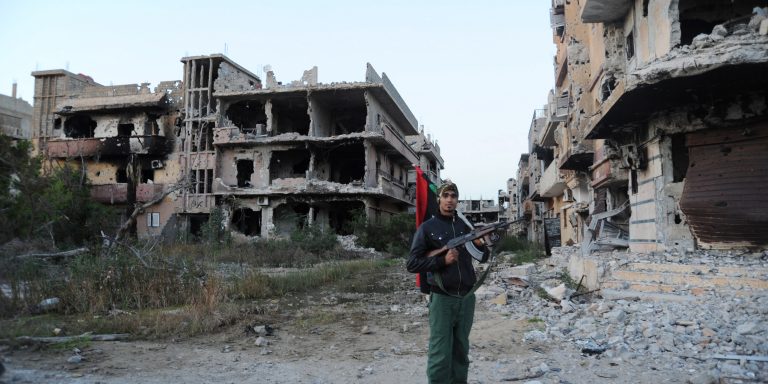INTELBRIEF
April 20, 2018
IntelBrief: Rising Conflict in Libya

- There is still public confusion around the health of General Haftar, commander of the Libyan National Army (LNA).
- General Haftar remains in Paris, where he is receiving medical care for an undisclosed condition, with speculation ranging from a stroke to cancer.
- General Haftar is seen by some as a rare national figure in locally-driven Libya, and by others as a military-strongman in the fashion of Gaddafi.
- On March 24, the U.S. launched its first airstrikes in Libya that didn’t target the Islamic State, but instead targeted al-Qaeda.
.
Libya has remained a deeply divided country in the seven years since a NATO-led campaign toppled the Gaddafi regime. Most of the power rests in local figures and local alliances, while the ‘official’ government of the Presidency Council (PC) that presides over the Tripoli-based Government of National Accord (GNA) has very little effective power, even inside Tripoli. The United States officially supports the PC/GNA but, as in other places in the Middle East, Washington finds itself trying to balance local democratic and effective government demands with a counter-terrorism mission that usually outweighs all other concerns.
This is clearly seen in the U.S. support for General Khalifa Haftar, the head of the Libyan National Army (LNA), which despite its name is not the national army of Libya. Yet Haftar is the closest person Libya has to a ‘national’ figure. He has a relatively broad base of support in the eastern part of the country, has close working ties with U.S. and European intelligence agencies, and has led a grinding military campaign against the many terrorist groups that for years have plagued cities including Benghazi, Sirte, and Derna. Haftar’s LNA has begun an operation to defeat terrorist groups in Derna at the same time serious questions have been raised about his health.
The health reports about Haftar’s, who is in Paris receiving medical care, range from a routine checkup to a debilitating stroke that has left him near death. Haftar had been in months-long talks hosted by Egypt on creating an official and effective national army for Libya, a basic requirement for a national government and one that has proven elusive as local power players and militias continue to hold the levers of influence. Were Haftar to be incapacitated or seriously ill, it would be a serious blow for prospects of increased national unity.
Haftar is not without critics, who see in him uncomfortable echoes of former dictator Gaddafi. Between political freedom and local security, many leaders tend to choose the former; Haftar is no different. In a March 2018 interview with the magazine Jeune Afrique, Haftar walked back from his agreement to hold elections with the Tripoli government by the end of 2018. He stated that ‘today’s Libya is not ripe for democracy,’ and that ‘perhaps future generations will succeed.’ The tendency to delay needed political reforms to address the seemingly more-urgent security concerns—in fact, linked to the lack of political reforms—is clearly seen in Egypt, where President al-Sisi has morphed into a Mubarak-styled ruler. Another general, Haftar could very well go down that path were he to assume greater national power while still prioritizing security over all else.
For its part, the U.S. has little influence to exert in Libya outside of a counterterrorism framework. The U.S. works closely with the LNA as well as the PC/GNA on counterterrorism issues, which include a diminished but still dangerous Islamic State presence as well as a deep-rooted al-Qaeda presence. Militarily, the U.S. conducted hundreds of airstrikes against terrorist targets, mostly in 2016; until late March 2018, all of those strikes had targeted the Islamic State, mostly in the coastal city of Sirte. However, on March 26, 2018, the U.S. conducted an airstrike in the southwestern part of the country near a town called Ubari. That strike was aimed at elements of al-Qaeda in the Islamic Maghreb (AQIM), a long-time AQ affiliate that operates in the Sahel region. Neither group, the Islamic State nor al-Qaeda, are going to be effectively defeated in the foreseeable future, with the U.S. stating it will maintain a persistent presence and coverage in the area, saying in a press statement after the March 26 strike that the U.S. ‘will not relent in its mission to degrade, disrupt, and destroy terrorist organizations and bring stability to the region.’
.
For tailored research and analysis, please contact: info@thesoufancenter.org
[video width="960" height="540" mp4="https://thesoufancenter.org/wp-content/uploads/2018/04/Final-Edit-1-177.mp4" poster="https://thesoufancenter.org/wp-content/uploads/2018/04/AP_16274383910838.jpg"][/video]